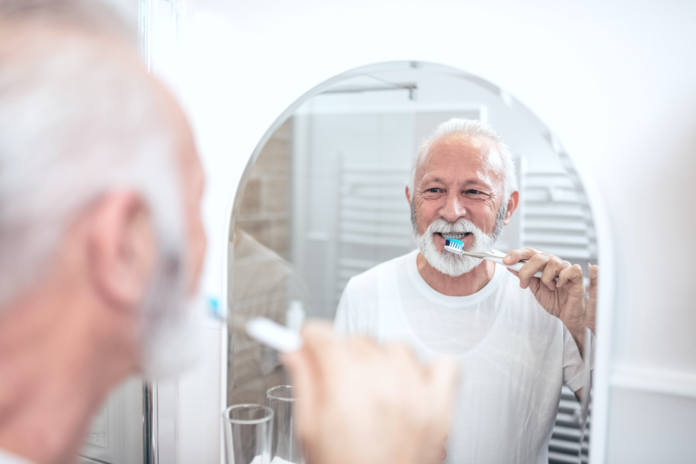Dental health does not always receive the spotlight it deserves. Metabolic and digestive health tend to muster more discussion, but dental health can have just as big of an impact on vitality and longevity.
Rather than wait for a dental problem to strike, learn more about senior dental care and how to prevent tooth and gum diseases in this article.
Why Is Oral Health Important?
Oral health is important, especially for older populations because it correlates with digestive health and can help prevent toothaches, cavities, and tooth loss and also preserves the ability to eat adequately. Plus, problems with the mouth can negatively affect other systems and their overall function.
The mouth hosts tons of bacteria: some good, some bad. Because the mouth is the entryway to the digestive and respiratory tracts and cardiovascular system to some extent, bacteria from the mouth can affect these pathways positively or negatively depending on oral health.
Even if poor oral health does not obviously affect one of these systems, an accumulation of bad bacteria in the mouth often leads to oral infections like tooth decay (cavities) and gum disease.
Effects of Oral Health
Various factors can affect oral health and as briefly mentioned, oral health may contribute to some specific states of disease.
Most notably, certain medications like decongestants, antihistamines, antidepressants, diuretics, and painkillers can disturb oral health by reducing saliva flow. Saliva cleans away food and neutralizes acid produced by mouth bacteria, which helps protect from bad microbes multiplying and leading to tooth or gum disease.
Additionally, HIV/AIDS and diabetes can negatively affect oral health. Both of these conditions lower the body’s resistance to infection, which can worsen mouth problems. What’s more, research shows that people with diabetes and gum disease have more difficulty managing blood sugar.
Poor oral health has also been linked to the following diseases/conditions although connections are not fully understood yet. For instance, osteoporosis has been linked with periodontal bone and tooth loss. Certain medications used to treat this condition pose a small risk of jaw bone damage.
Some of other examples include:
- Endocarditis (infection of the inner lining of the heart)
- Cardiovascular/heart disease
- Premature birth and low birth weight
- Pneumonia
- Alzheimer’s disease
- Rheumatoid arthritis
- Sjogren’s syndrome
- Certain cancers
- Other autoimmune disorders
Researchers, once again, hypothesize that the bad bacteria from the mouth travels through the bloodstream to these other areas causing disruption.
Thankfully, proper oral hygiene can help prevent complications or at least reduce severity, which will be discussed below!
Common Senior Oral Diseases
Advanced aging can put seniors at risk for numerous oral health problems such as darkened teeth and root decay. Dryness, taste, and other issues are also at risk.
Darkened Teeth
Various foods and beverages can stain and darken teeth including coffee, tea, red wine, soda, fruit juices, tomato based sauces, curry, balsamic vinegar and soy sauce. This is mostly due to the tannins in these substances.
Additionally, aging naturally reduces the dentin, the tissue that underlies tooth enamel and thins the outer layer of enamel, which is what ultimately promotes the dark yellow color.
Dry Mouth
This condition may be caused by naturally-reduced saliva flow as one ages. It may also be the result of certain cancer treatment, autoimmune diseases, or medications may promote bad bacteria and food particles to remain in the mouth.
Root Decay
Certain acids can decay tooth roots. As gum tissue recedes, less enamel protects them, which exposes them and leads to this decay. This is also why roots are more prone to damage than tooth crowns.
Gum Disease
Gum disease, also known as periodontal disease, is another common issue among older adults. It is also the leading cause of tooth loss, another common oral problem among seniors.
Gum disease is caused by plaque build-up, tobacco use, poor-fitting bridges or dentures, unhealthy diet and certain diseases like anemia, cancer, and diabetes, and is worsened by food remaining in teeth.
Uneven Jaw Bone
When missing teeth are not replaced, the remaining ones can drift and shift into the open spaces and cause uneven jaws. This is problematic towards eating certain textures, which may lead to unnecessary or dangerous weight loss.
Thrush
Otherwise known as fungus or Candida overgrowth in the mouth, this is caused by diseases or drugs that affect the immune system such as Celiac, HIV/AIDS, and osteoporosis.
Denture-Induced Stomatitis
This is a fancy phrase for inflammation of the tissue underlying a denture and can be caused by ill-fitting dentures, poor dental care, or a buildup of Candida albicans (fungus overgrowth).
Diminished Taste
A sensory loss related to natural aging, it can also be caused by certain diseases, medications, or dentures. Like thrush, it can diminish one’s appetite and lead to unintended weight loss.
Preventative Tips & Treatment Options
While not an exhaustive list, these 10 dental care tips for seniors can greatly reduce risk of developing an oral disease, in turn, preserving optimal overall health too.
- Brush teeth twice a day.
- Use Fluoride toothpaste.
- Floss daily.
- Use mouthwash one to two times a day, preferably after a meal.
- Consume a healthy low acidic diet and minimize refined and added sugar foods and beverages.
- Replace toothbrush every three months.
- Schedule regular dental appointments to maintain oral health and discuss any problems with the dentist.
- Avoid tobacco.
- Limit alcohol to 3 to 4 drinks per week for males and 1 to 2 drinks for females.
- Look for mouth changes including sore spots, lumps, white or red patches, numbness of the tongue or mouth, and swelling in the jaw. Also pay attention to ear pain absent of hearing loss and any difficulty chewing, swallowing, or moving the tongue and jaw.
When prevention is not possible, discuss treatment options for specific oral diseases with a qualified dentist. Often, dental services will treat the condition with oral hygiene care, medication, tooth replacement, denture fittings, and other modalities.
If the condition affects multiple systems or is caused by another underlying problem, they may need to refer to another specialist to assist in treatment.
In Summary
Good dental care and oral hygiene are linked to overall health more than many people realize, especially so for the senior population. Due to the natural aging process and other common senior conditions, oral health tends to decline.
However, proper mouth hygiene can substantially reduce risk and/or severity of oral issues. Close monitoring of the mouth and regularly visiting the dentist is just as important as taking the other measures mentioned.
References:
Dental Care for Seniors. WebMD. Published October 9, 2019. http://www.webmd.com/oral-health/guide/dental-care-seniors#2.
Oral Health for Older Adults: Quick tips. Oral Health for Older Adults: Quick tips – MyHealthfinder. https://health.gov/myhealthfinder/topics/doctor-visits/regular-checkups/oral-health-older-adults-quick-tips.
Oral health: A window to your overall health. Mayo Clinic. Published June 4, 2019. http://www.mayoclinic.org/healthy-lifestyle/adult-health/in-depth/dental/art-20047475#:~:text=Normally%20the%20body’s%20natural%20defenses,tooth%20decay%20and%20gum%20disease.






